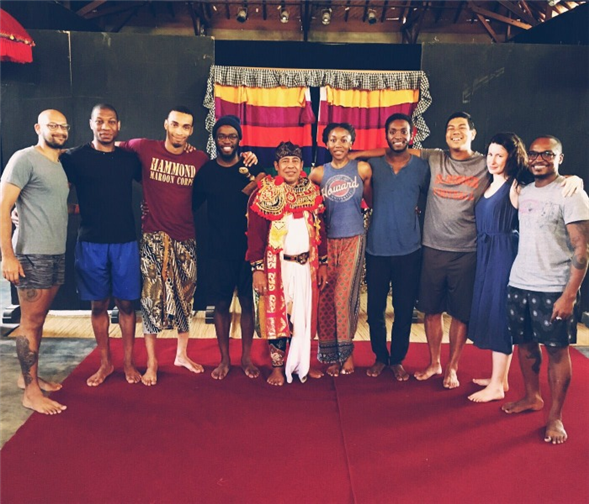Translate Page

How a trip abroad changed one playwright's perspective on the way theatre is created
---
When I traveled to Bali earlier this year, I suspected I would learn something. I didn't realize, however, that studying Topeng Pajegan -- a form in which a single performer blends dance, song, vocal chanting, and comic monologues -- would make me question which elements of the theatre I unconsciously favor.
Before I could reflect on my own biases, of course, I had to reckon with how these Balinese performances were structured. In Topeng Pajegan, the dancer uses a variety of masks to transform into an array of characters while an orchestra accompanies him. During my stay, I observed many Topeng performances in the context of religious ceremonies. They felt rigidly defined, adhering to a strict order of characters: Prime Minister, Old Man, Penasar (Old Court Attendant), King, and Sidhakarya (the one who completes the ceremony).
These performances got my dramaturgical senses tingling. Where a Western tradition steeped in Aristotle may ground its dramas in plot or action, character seemed to be the dominant principle for the Topeng.
Then came a performance by a dancer named I. Nyoman Catra. His take on Topeng began exactly as the others I'd seen. After the Old Man, however, a new mask appeared. The character seemed to be a woman whose deft eye movements lingered somewhere between throwing shade and seducing. That was new.
The game changed again with Catra's Penasar. The other Penasar characters I'd seen performed a monologue in Balinese. The tone felt comic, but because of the language barrier I wasn't sure what I was hearing. Catra's Penasar began in Balinese, too, but he quickly shifted to English. "You understand this?" he asked. "Of course not, because I'm speaking in old Balinese language." Pointing to the orchestra, he added, "These dummies don't even understand!"
I was stumped. I'd just been introduced to an English-speaking clown figure that I didn't know could exist. Catra continued to present new characters: an old man looking for his son, an oafish security guard, a roadside salesman. Each spoke English to the predominantly American audience. Befuddled, I wondered, Does he speak English in all of his performances? Does Catra memorize each character's lines in Balinese and in English?
When I spoke to him later, Catra clarified the use of language in Topeng. It's completely improvised. "We don't have to worry to say the same thing," he explained. "In Western style, you have a script. Here we have the character, the mask, and then the words. They come up in the body."
I was struck by the differences between Topeng and most of the theatre I create back home. In the United States, we tend to ground our theatre in the script. Those written words create a foundation on which to play, build, and create other elements of performance such as scenography, costumes, or music. The Topeng form instead uses character and music as a foundation, freeing up the words to vary from performance to performance. That kind of improvisation leads to an immediacy and direct connection with the audience that is often difficult to attain in a scripted live performance.
Now I wonder: Have I been setting up an inherent preference for the written word? If so, what am I missing by not thinking about other means of grounding my work? Am I not considering the full spectrum of how theatre can be created? Back home in America, it's time to toss out the script and experiment.
---
Taylor Barfield is a writer and dramaturg based in New Haven.
Photo by Galen Kane. After a performance by I. Nyoman Catra (center) at the GEOKS Performance Center in Singapadu, Bali.
TDF Members: Browse our discounted tickets to theatre, dance, and concerts.